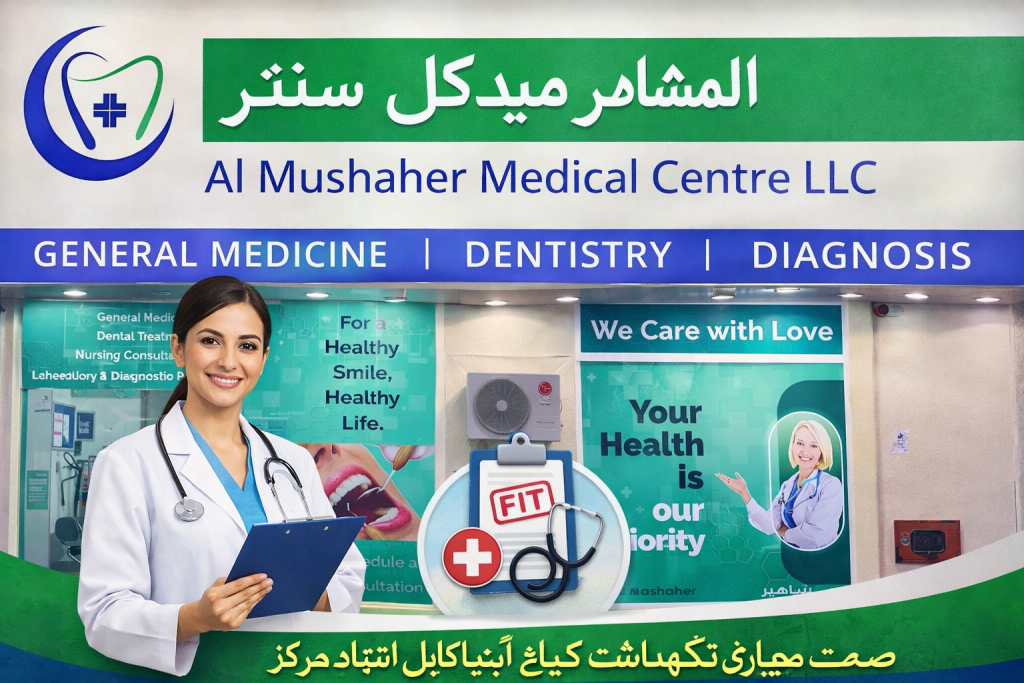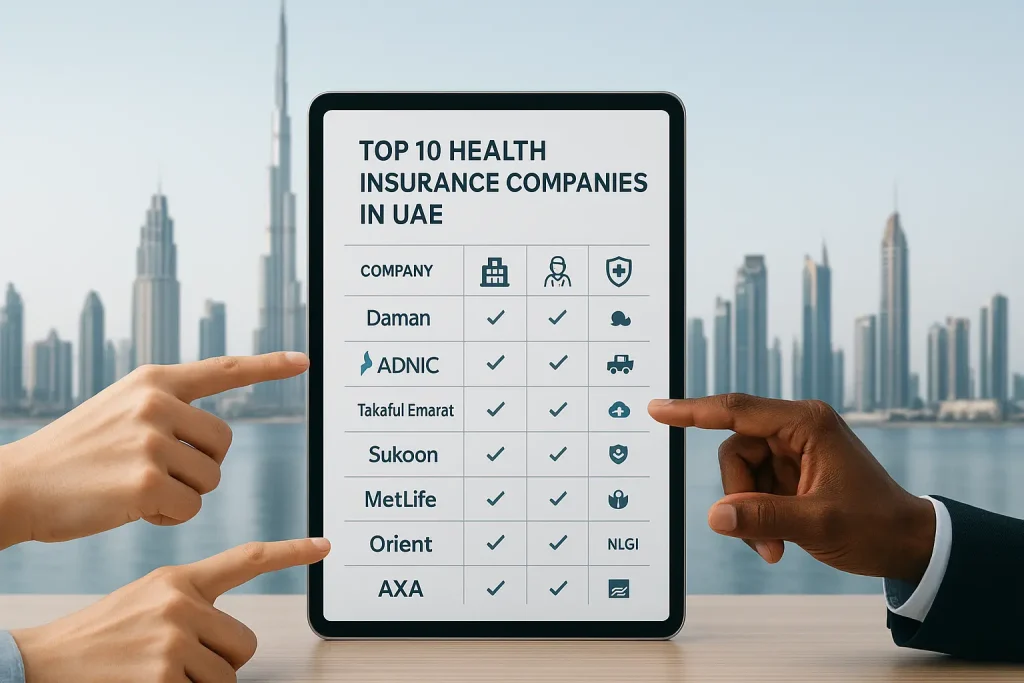The Definitive Guide to the Best UAE Health Insurance: Comparing 2025 Mandates, Top Providers, and Costs
I. Introduction: The Critical Shift in UAE Health Insurance for 2025
The search for the best health insurance in UAE has never been more critical. As the nation’s healthcare sector expands—projected to reach a market value of $14.9 Billion by 2033—it is simultaneously undergoing the most significant regulatory overhaul in a decade. This change, coupled with a dramatic 12.5% projected medical inflation in 2024, means that what constituted “the best” policy last year is rapidly becoming obsolete.
For both employers managing substantial group plans (which comprise 70.3% of the market) and individual residents, the challenge is twofold: navigating the new, mandatory nationwide coverage requirements that took effect on January 1, 2025, and securing a plan that provides genuine financial protection against escalating medical costs.
This definitive guide synthesizes the latest regulatory data and market intelligence to offer an authoritative, actionable blueprint. We will provide a side-by-side comparison of the mandatory Basic Schemes (including the new, fixed-rate AED 320 plan for the Northern Emirates) against premium options, helping you select a policy that guarantees compliance and delivers superior value.
II. Navigating the 2025 Mandatory Health Insurance Laws: Essential Compliance for Employers and Residents
To select the best plan, one must first understand the legal minimums. The UAE’s healthcare ecosystem is regulated regionally by authorities like the Dubai Health Authority (DHA) and the Department of Health (DoH) in Abu Dhabi, but the 2025 expansion is driven by a federal directive.
2.1. The Nationwide Mandate: Scope and Enforcement (January 2025)
The major structural shift in the UAE health insurance landscape is the expansion of mandatory coverage to all Emirates, including the Northern Emirates of Sharjah, Ajman, Fujairah, Ras Al Khaimah, and Umm Al Quwain.
This mandate makes employers and sponsors legally responsible for securing a policy for their foreign employees and domestic workers. Critically, the issuance or renewal of residency permits, which began on January 1, 2025, is now directly contingent upon proof of this new health insurance coverage. The Ministry of Human Resources and Emiratisation (MOHRE) oversees this federal expansion.
2.2. DHA Essential Benefits Plan (EBP) vs. MOHRE Basic Scheme: A Critical Comparison
The regulations create two distinct minimum standards. The content that currently ranks highly often fails to clearly distinguish between these two mandatory, minimum-coverage schemes, creating a critical Regulatory Clarity Gap.
Dubai Health Authority (DHA) Essential Benefits Plan (EBP)
The established DHA mandate, in effect since 2016, requires employers in Dubai to provide the Essential Benefits Plan (EBP) for employees earning under AED 4,000 per month and for domestic workers. This plan offers an aggregate annual coverage limit of AED 150,000.
MOHRE Basic Health Insurance Scheme (Northern Emirates)
The new federal directive introduced a distinct Basic Health Insurance package for private sector employees and domestic workers in the Northern Emirates. This scheme, designed for affordability and compliance, is offered at a fixed, highly competitive annual premium of just AED 320.
The table below outlines the specific differences in benefits and cost-sharing obligations:
| Feature | Dubai DHA Essential Benefits Plan (EBP) | MOHRE Basic Scheme (Northern Emirates) 2025 |
|---|---|---|
| Authority | Dubai Health Authority (DHA) | Ministry of Human Resources and Emiratisation (MOHRE) |
| Annual Premium (Fixed) | Varies by insurer, typically minimum AED 550 – 750 | AED 320 (Federally fixed competitive price) |
| Maximum Annual Limit | AED 150,000 | AED 150,000 |
| Inpatient Co-payment | Typically 10% – 20% | 20% (Capped at AED 500/visit, max AED 1,000/year) |
| Outpatient Co-payment | Typically 20% – 30% | 25% (Capped at AED 100/visit) |
| Medication Co-payment | Not explicitly listed in EBP minimums | 30% (Capped at AED 1,500 annually) |
III. The Financial Reality: Why the UAE’s Medical Inflation Demands Enhanced Coverage
While the DHA and MOHRE basic plans ensure compliance, market realities strongly suggest that these schemes are insufficient for true financial risk management.
3.1. The Inflation Headwind: Understanding the 12.5% Cost Surge
The UAE health market is currently facing a 12.5% projected medical inflation rate in 2024. This inflationary pressure is driven by expensive claims related to specialized treatments, such as oncology and cardiovascular care.
This trend has immediate, quantifiable consequences for employers and individuals: corporate premium renewals in Dubai saw increases climbing up to 35% in late 2024. This financial pressure is pushing the market toward a focus on digital cost-saving measures, such as telehealth, which has already diverted 70.2% of chat interactions away from physical clinics for major providers.
3.2. When AED 150,000 Isn’t Enough: Coverage Gaps in Basic Plans
The AED 150,000 annual limit provided by both mandatory schemes is best categorized as a compliance minimum, not a sufficient safety net. For complex or chronic health conditions, this limit can be exhausted rapidly.
For employees and families, this financial exposure is significant. Enhanced plans are critical for services such as:
Higher Maternity Limits
Basic plans often cap maternity coverage low (e.g., AED 7,000).
Specialized Treatments
Hearing aids, vision aids, and vision correction surgeries are typically excluded from basic plans, except in emergencies.
Global Coverage
Basic policies are restricted to the UAE, while enhanced tiers offer regional or worldwide coverage, essential for expatriates and frequent travelers.
IV. Top 10 Best Health Insurance Companies in the UAE (2025 Methodology)
Our ranking methodology goes beyond market size, focusing on network density, financial stability, specialized offerings, and regulatory compliance.
4.1. Local Giants: Daman, Orient, and ADNIC – Network Strength and Stability
These carriers are essential for both corporate group policies and comprehensive individual plans, owing to their vast networks and financial stability.
Daman Health Insurance
As the National Health Insurance Company, Daman is a market benchmark. It manages the Thiqa program for UAE nationals and boasts over 3 million members and an extensive network of more than 2,000 providers across the country. Its plans range from the Basic EBP to premium Platinum tiers with annual limits up to AED 20 Million. Daman was also ranked first in a 2024 survey for claim settlement speed satisfaction.
Orient Insurance
Recognized for being one of the most trusted and financially stable health insurance companies in the UAE, making it a reliable choice for large corporations seeking dependable group schemes.
ADNIC Health Insurance
Known for its robust corporate and enhanced health plans, ADNIC is consistently cited among the top insurers due to its reliability and strong local presence.
4.2. Specialized and Niche Providers: Takaful and Global Carriers
For specific needs like Shariah compliance, global travel, or high-net-worth coverage, specialized carriers offer tailored solutions.
Takaful Emarat and Watania Takaful
These Shariah-compliant mutual insurance providers have seen rapid market growth (Takaful insurers achieved 84% revenue growth in 2024). Takaful Emarat’s enhanced Health+ plans, such as the Rhodium and Platinum tiers, stand out by offering significant benefits often excluded from conventional basic plans, including worldwide coverage, up to AED 3,000 in dental benefits, and up to 20 physiotherapy sessions.
MetLife and Bupa Global
MetLife is highly popular among expatriates due to its strong international coverage and access to a global network, catering to residents who travel frequently. Bupa Global specializes in high-net-worth clients seeking elective treatment and coverage outside the UAE.
Sukoon (Oman Insurance)
A well-established player with an A- Excellent Rating by A.M. Best and Fitch, offering reliability and a wide network.
Top 10 UAE Health Insurance Providers and Key USPs
| Company | Primary Network Strength | Ideal For | Key Differentiator |
|---|---|---|---|
| Daman Health Insurance | Extensive (2,000+ providers) | Abu Dhabi Residents, EBP/Basic Coverage | Government-backed, Dominant market share (3M members), Thiqa administrator |
| Orient Insurance | High Financial Stability | Comprehensive Corporate/Group Plans | One of the most trusted and financially stable insurers |
| MetLife | Global Network | Expatriates, Frequent Travelers | Strong international coverage, comprehensive benefits (maternity, dental, vision) |
| Takaful Emarat | Competitive Pricing (TPA: Mednet) | Shariah-Compliant Seekers, Families | Shariah-compliant mutual model, specialized riders (dental, physio) |
| ADNIC | Strong UAE Presence | Large Corporations, Diverse Needs | Highly reputable local player, broad coverage for individuals and businesses |
| Sukoon (Oman Insurance) | Wide Network | General Residents seeking stability | A- Excellent Rating by A.M. Best and Fitch, established player |
| HAYAH | Competitive Plans | Value-Focused Individuals/Families | Provides cost-effective, reliable plans |
| Cigna | International/Expat Focus | Multinational Employees | Offers enhanced health plans, strong global network |
| AXA Gulf | Broad Provider Access | Value-Conscious Expatriates | Reliable service and vast provider network |
| Watania Takaful | Shariah-Compliant | Individuals and Businesses | Shariah-compliant solutions for individuals, families, and businesses |
V. Maximizing Value: How to Use the Health Insurance Premium Calculator
Competitors rely on premium calculators as simple lead capture tools. To maximize value, you must understand the factors that drive the cost before using the tool.
5.1. What Affects Your Premium? Decoding the Actuarial Factors
The cost of your premium is determined by several specific variables required by online calculators. Understanding these factors helps you accurately estimate costs and compare plans.
Age and Gender
Age is the most significant factor, as medical risk generally increases over time.
City/Emirate
Premiums are typically higher in Dubai, which holds 65.02% of the total UAE health market, due to the high concentration of expensive private healthcare providers.
Sponsor Age and Policy Type
Whether you select an individual, family, or corporate group plan, and the age of the primary sponsor, all affect the final cost.
Medical History and Lifestyle
Chronic health conditions (such as diabetes) and lifestyle habits (e.g., smoking or drinking) introduce higher risk and consequently inflate premium costs.
5.2. Leveraging Comparison Aggregators for Best Value
For optimal comparison, utilizing an insurance aggregator is recommended. Platforms like Souqalmal and Yallacompare allow users to compare diverse health insurance products from different providers side-by-side, ensuring transparency on inclusions, pricing, and overall value. They are designed to simplify complex comparison processes and help consumers make informed decisions quickly.
VI. Strategic Selection: Key Criteria Beyond Price
The selection process should extend beyond price and maximum limits to essential components that affect daily access and financial security.
6.1. Network Density: Why Daman’s 3,000+ Providers Matter
The geographic scope and density of the provider network are paramount for routine access. Carriers with vast networks, such as Daman with its extensive 2,000+ network across the UAE, guarantee adequate access to healthcare providers near your residence or place of work in Dubai. For expatriates, the global network access offered by carriers like MetLife and Bupa is a non-negotiable factor.
6.2. Claim Settlement Speed and Digital Services
Efficiency in processing claims is crucial, especially given the rapid medical inflation. Leading insurers are focusing on digitalization and quick claim processing. For example, Daman’s top ranking in 2024 for customer satisfaction regarding claim settlement speed highlights the importance of reliable service.
6.3. The Value of Customization: Riders for Dental, Optical, and Global Access
For employers focused on talent retention and individuals seeking comprehensive care, flexible plans are key. Non-essential services like dental consultation, vision aids, and certain specialized treatments are often subject to high co-insurance or exclusion in basic plans. High-quality plans, such as Takaful Emarat’s enhanced options, include the option to add specialized riders for dental benefits (up to AED 3,000) and optical coverage (up to AED 1,500). These riders are essential for creating an employee benefits package that exceeds the statutory limitations and provides true value.
VII. Frequently Asked Questions (FAQ)
Q1: Is health insurance now mandatory for all residents in the UAE?
Yes. Following the 2025 federal mandate expansion, health insurance is mandatory for all foreign employees and domestic workers across every Emirate, including the Northern Emirates (Sharjah, Ajman, RAK, UAQ, Fujairah).
Q2: What is the new cost for the Basic Health Insurance Plan in the Northern Emirates?
The new MOHRE Basic Health Insurance package for private sector employees and domestic workers in the Northern Emirates is offered at a highly competitive, fixed annual premium of AED 320.
Q3: What is the maximum coverage limit under the Basic Schemes (DHA EBP and MOHRE)?
Both the DHA Essential Benefits Plan (EBP) and the new MOHRE Basic Scheme provide an annual aggregate coverage limit of up to AED 150,000.
Q4: Which are the largest health insurance companies in the UAE?
Daman is one of the largest and most prominent insurers, with over 3 million members and strong government-backed credentials. Orient, ADNIC, and Sukoon are also recognized as major players known for financial stability and extensive networks.
Q5: Does the mandatory Basic Health Insurance Plan cover dental and optical care?
Generally, the mandatory Basic Schemes (DHA EBP and MOHRE) do not include routine dental, optical, or vision aids, which are considered excluded, non-basic healthcare services. These benefits must typically be obtained through an enhanced plan or by purchasing specialized riders.
VIII. Conclusion and Strategic Takeaways
The competitive landscape for best health insurance in UAE has fundamentally shifted. The new gold standard for content must provide the depth and regulatory clarity that existing aggregators lack.
By focusing on the 2025 regulatory changes—specifically comparing the new MOHRE Basic Scheme (AED 320 fixed premium) against the established DHA EBP—and contextualizing this against the severe headwind of 12.5% medical inflation, this guide provides unmatched authority and value. For employers, the key is to move beyond the compliance minimum to secure enhanced coverage that mitigates risk and ensures employee retention, using comparison tools to find the optimal balance of network strength, claim speed, and specialized benefits like Takaful’s unique riders.







